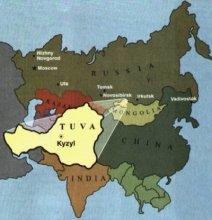 Population: 264,000
Population: 264,000
Language: Tuvan, a Turkic language
Region: The Republic of Tuva, south Siberia
Capital: Kyzyl
Religion: Turkic animistic shamanism practiced alongside with Tibetan Buddhism, Evangelical churches, Orthodox Christianity (Liturgy translated and held in Tuvan)
Bible texts: Children’s Bible (2001, revised New Testament (2001), Bible (2011)
Bible portions on IBT website: Bible, Children’s Bible, NT audio
Audio recordings: NT (2012), revised CB (2014), Psalms (2016)
Current work in progress: audio recording of the OT
Tuva is a beautiful land in the southern part of Siberia bordering on Mongolia, at the very centre of the Asian continent. Though the majority of Tuvans are traditionally Buddhists or Shamanists, there is a rapidly growing number of Christians. In fact, Tuva has the highest percentage of evangelical Christians of any region in the Russian Federation, after only a single generation of the Gospel being proclaimed among the Tuvan people. The local churches have h ad active input into the translation of the biblical texts. Even Tuvans who venerate Buddha or seek comfort in shamanistic rites are frequently open to hearing the words of the Gospel message.
ad active input into the translation of the biblical texts. Even Tuvans who venerate Buddha or seek comfort in shamanistic rites are frequently open to hearing the words of the Gospel message.
The first-ever full Tuvan Bible was published in 2011. Tuvan is the first language into which the whole Bible has been translated by IBT Russia/CIS. One Baptist lady from a local church gave her testimony during the Bible dedication: “My parents were pagans. When I heard the words of the Gospel for the first time, I asked my father, 'Why are you worshiping trees? They're just the creation of God and nothing else!' He kept silent and didn’t want to argue with me. Then I thought about Buddha: 'Did he die on the cross? Did he shed his blood for the sins of men? Has he risen from the dead? No!' And then I realised what the words of the Gospel meant, 'It is by grace you have been saved, through faith - and this not from yourselves, it is the gift of God', and I accepted Jesus.”
In 2016 Tuvan Christians participated in a workshop on “Creating ethnocultural websites”. The new Tuvan website was launched and is being further developed.
T he OT audio recording: The main work in the Tuvan project is currently focused on audio recording the entire Old Testament with the help of our partner organization Hosanna/FCBH, which recorded the Tuvan New Testament in 2012. Work on recording is in progress in Kyzyl using Hosanna’s “Virtual Recording” technology. The recording team is moving book by book until the full OT is recorded and made available on the web and in apps. Once the Old Testament is recorded, many more Tuvans will be able to hear the message of the Bible in their mother tongue even if they are not yet very interested in reading it. The audio recording of Psalms produced by IBT in 2015 was a pilot project in this respect.
he OT audio recording: The main work in the Tuvan project is currently focused on audio recording the entire Old Testament with the help of our partner organization Hosanna/FCBH, which recorded the Tuvan New Testament in 2012. Work on recording is in progress in Kyzyl using Hosanna’s “Virtual Recording” technology. The recording team is moving book by book until the full OT is recorded and made available on the web and in apps. Once the Old Testament is recorded, many more Tuvans will be able to hear the message of the Bible in their mother tongue even if they are not yet very interested in reading it. The audio recording of Psalms produced by IBT in 2015 was a pilot project in this respect.
The first two short books of the OT, Ruth and Jonah, were audio recorded with multiple voices, but as it proved to be a hard task to find good readers, the team and our audio technician decided to record most of the other OT books with only one reader per book. We have added Tuvan music to the audio recording of Psalms. Musical tracks for the audio recordings of Ruth and Jonah have been overlaid on the readers’ voices by Hosanna/FCBH. All other OT books will also be released with Tuvan music, which makes the recording much more interesting for Tuvan listeners. CDs of Psalms have been passed on to churches and libraries in Tuva and the recording can also be listened to on our website and on SoundCloud.com. Ruth and Jonah have recently become available on these digital platforms too, and Genesis will become available in the near future.
Current situation: The Pentateuch, Joshua, Judges, Ruth, 1-2 Samuel, 1-2 Kings, 1-2 Chronicles, Ezra, Nehemiah, Esther, Psalms, Ecclesiastes, Song of Songs, Isaiah, Lamentations, Daniel and several Minor Prophets have been audio recorded by now. The multi-voice audio-recording of Jonah and single-voice recordings of Hosea and Amos need to be finalized. Audio-recording of Job, Jeremiah, Ezekiel, Micah, Zechariah and Malachi is also in process. We need to receive scripts from FCBH for two additional multi-voice recordings (Proverbs and Habbakuk) and audio record these books. The team is selecting and adding Tuvan musical tracks for the OT books. A member of a famous Tuvan music group lent his voice to the OT recording project as a reader. Voice audio recording of the whole OT was finished at the end of 2020. Further editing, mastering and adding music is planned for 2021. The existing recordings of OT and NT books on a device called the Proclaimer are being distributed among Tuvans who live in yurts and do not have access to a computer or the internet.
Other Scripture Engagement products have also been coming out in Tuvan as of late. In 2019 video clips with 5 Psalms in Tuvan were published on YouTube; the Lumo film on the Gospel of Mark was dubbed into Tuvan by FCBH/Hosanna; and the Prodigal Son animated cartoon was dubbed into Tuvan by another partner organization.
Our hope is that a full audio recording of the Tuvan Bible will attract the attention of the primarily oral Tuvan society significantly more than just the printed text alone. Also, having a recording of the full Bible available in Tuvan opens the door for interesting Scripture Engagement video projects in the future.
Your donation will help the Tuvan OT audio recording project to be continued in 2021.

Share: